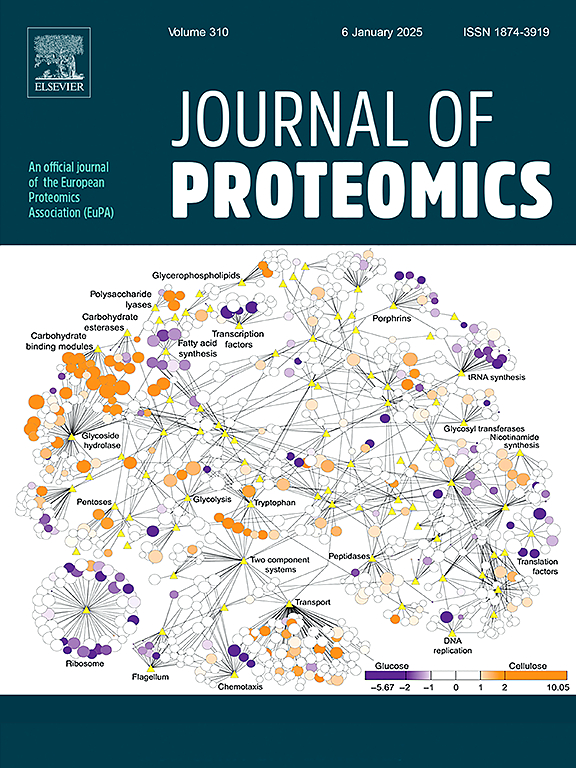基于itraq的定量蛋白质组学揭示纤维连接蛋白1的失调有助于复发性着床失败的子宫内膜去个体化受损
IF 2.8
2区 生物学
Q2 BIOCHEMICAL RESEARCH METHODS
引用次数: 0
摘要
反复着床失败(RIF)是胚胎成功着床的一大挑战。在这项研究中,我们使用等压标签进行相对和绝对定量(iTRAQ)来分析RIF患者的子宫内膜蛋白丰度。通过功能和通路分析,发现ecm相关蛋白包括纤维连接蛋白1 (FN1)、I型胶原α 2链(COL1A2)和整合素β -1 (ITGB1)与RIF相关。相关分析发现TGF-β1是FN1的上游调节因子。敲除实验表明,TGF-β1下调可抑制FN1表达,抑制去个体化标记物。我们的研究结果表明TGF-β1/FN1轴失调与RIF中观察到的去个体化受损之间存在机制联系。我们的研究解决了辅助生殖技术的一个重大障碍——RIF的紧迫问题。通过使用等压标签进行相对和绝对定量(iTRAQ),我们全面分析了RIF患者子宫内膜蛋白丰度。通过功能和途径富集分析,我们发现了细胞外基质(ECM)相关蛋白的失调,包括FN1、COL1A2和ITGB1,揭示了它们在植入失败中的潜在作用。此外,我们的相关分析显示TGF-β1是FN1的上游调节因子,这表明一个新的调节轴参与去个体化。敲低实验进一步证实了TGF-β1和FN1对去个体化标志物的影响。这项研究有助于更好地理解RIF的分子机制。本文章由计算机程序翻译,如有差异,请以英文原文为准。

iTRAQ-based quantitative proteomics reveals dysregulation of fibronectin 1 contributes to impaired endometrial decidualization in recurrent implantation failure
Recurrent implantation failure (RIF) poses challenges to successful embryo implantation. In this study, we utilized isobaric tags for relative and absolute quantification (iTRAQ) to profile endometrial protein abundance in RIF patients. Through functional and pathway analyses, ECM-related proteins including fibronectin 1 (FN1), collagen type I alpha 2 chain (COL1A2), and integrin beta-1 (ITGB1) were revealed to be associated with RIF. Correlation analysis identified TGF-β1 as an upstream regulator of FN1. Knockdown experiments showed TGF-β1 downregulation could inhibit FN1 expression to inhibit decidualization markers. Our findings suggest a mechanistic link between TGF-β1/FN1 axis dysregulation and impaired decidualization observed in RIF.
Significance
Our study addresses the pressing issue of RIF, a significant obstacle in assisted reproductive technology. By employing isobaric tags for relative and absolute quantification (iTRAQ), we comprehensively analyzed endometrial protein abundance in RIF patients. Through functional and pathway enrichment analyses, we identified dysregulation in extracellular matrix (ECM)-related proteins, including FN1, COL1A2, and ITGB1, shedding light on their potential roles in implantation failure. Additionally, our correlation analysis revealed TGF-β1 as an upstream regulator of FN1, suggesting a novel regulatory axis involved in decidualization. Knockdown experiments further demonstrated the impact of TGF-β1 and FN1 on decidualization markers. This study contributes to a better understanding of the molecular mechanisms underlying RIF.
求助全文
通过发布文献求助,成功后即可免费获取论文全文。
去求助
来源期刊

Journal of proteomics
生物-生化研究方法
CiteScore
7.10
自引率
3.00%
发文量
227
审稿时长
73 days
期刊介绍:
Journal of Proteomics is aimed at protein scientists and analytical chemists in the field of proteomics, biomarker discovery, protein analytics, plant proteomics, microbial and animal proteomics, human studies, tissue imaging by mass spectrometry, non-conventional and non-model organism proteomics, and protein bioinformatics. The journal welcomes papers in new and upcoming areas such as metabolomics, genomics, systems biology, toxicogenomics, pharmacoproteomics.
Journal of Proteomics unifies both fundamental scientists and clinicians, and includes translational research. Suggestions for reviews, webinars and thematic issues are welcome.
 求助内容:
求助内容: 应助结果提醒方式:
应助结果提醒方式:


